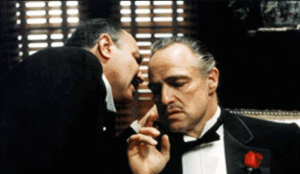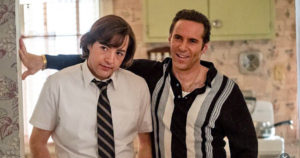As an Italian-American teen growing up in the Sopranoland of New Jersey, I dreamed of getting involved in the Mob. It was the paisan equivalent of being attracted to thug life, to living dangerously and not taking orders from anyone.
Living on the Jersey Shore, in a vacation spot that emptied out after Labor Day, my partners in petty crime and I would break into summer homes, and go for the fridge, the beer, the hard liquor. But unlike my ruffian peers, who weren’t Italian, I was intrigued by the mobster life of The Godfather. In parts of North Jersey, say Jersey City or Hoboken, it would have been different, but my attraction to what they referred to as “the life” was more or less solitary in my pretty Anglo working-class neighbourhood.
Upwardly mobile and eager to anglicise, my father hated the Mob and the rep it gave to first generation Italians. I had the build and the inclination for boxing, but because of the well-known connection between the sport and the mafia, he would have preferred me to stick to baseball or football — even though my grandfather, born in Italy and raised in Brooklyn, was a boxing instructor and an infantryman in the Marines during the First World War.
But I loved the way the Mob guys carried themselves. To me they were like pirates, “born to hang”, unafraid of death or long prison terms. They didn’t take shit from anyone and made mounds of money, and I admired them for that, for both their balls and their ability to make tons of dough.
There’s a famous section in The Phenomenology of Spirit about a master and a slave, in which Hegel offers a creation myth. Two forms of primeval self-consciousnesses confront one another for the first time. The one who is willing to fight to the death, and overcomes their will to live, becomes the lord. The other, done in by fears, becomes the slave. Evidence of Hegel’s psychological point abounds. The films coming out of Hollywood and shows streaming on Netflix bear witness to our fascination with individuals who prefer to play the part of Hegel’s lord, by putting their lives at risk. There is something transcendent about what Nietzsche would call “the will to power” overcoming the terror of death. Yes, just about everyone longs to be the tough guy, the guy who bucks up their courage, stands up to the bully and knocks him or her out.
For me, becoming the Jersey Shore version of Tony Soprano wasn’t just an instinct. There was a lot of love in my home but also a lot of violence, fists and backhands flying. My attraction to the Mob was like my determination to box: both came from a desire to be invulnerable and express the rage I felt coming from a home that was routinely turned upside down by family fights. There were no gyms in our summer beach town, but I was so smitten with boxing that at 15 I began hitch hiking 70 miles each way to Philadelphia, where I took a bus uptown to what was then Dan Bucceroni’s School of Boxing, but would later be Joe Frazier’s Gym.
When I was a little older, I also started taking the bus into the Big Apple. On one ride, I sat next to an ex-con who hinted that he was involved with the Mob. Whether true or false, I ate up his tales about hijacking trucks like a good dish of Rigatoni.
Despite my chequered behaviour record, I was a fairly successful student, and a standout in football. Miraculously, I was accepted at Columbia University. But this didn’t end my mafia fascination; in fact, ironically, one philosophy class actually spurred it. “Question everything” is a piety amongst the lovers of wisdom. And question we did. In a course on ethics, the professor presented the four major theories used to justify moral judgments. It was evident that each of them had fatal flaws, which my sophomoric mind interpreted as licence to go beyond good and evil, and eased my conscience about entering a life of crime.
It didn’t help that college didn’t suit me. My football days were done for by an injury, and I was intimidated by my fellow students, who not only knew how to sit still but also a foreign language or two. I retreated to the boxing gym. After sparring sessions, I’d invariably be left with two shiners, which I wore like badges of honour. I would walk back to my apartment through Times Square strutting like John Travolta in the opening scene of Saturday Night Fever. There were stops at topless bars. One of them, like the Badda Bing in The Sopranos, was run by the Mob. The more I stopped there and talked boxing the more I got to be buddies with a bouncer from Bay Ridge. I spoke a little Italian so with that, my Abruzzi roots, and boxing, I was a mafia draft choice, though my recruitment remained implicit, just a job in a Mob joint that might become something more.
At the time, the Hall of Fame fighter Jake LaMotta worked as a doorman at my favourite watering hole. He was soon leaving for Los Angeles to help with the filming of the LaMotta biopic Raging Bull, in which he’s played by Robert De Niro. On my friend’s recommendation, I took over Jake’s 6pm to 2am shift at the club. You would have thought I’d earned a Rhodes Scholarship, that’s how elated I was about being admitted to the club within the club. Story had it that six weeks earlier someone came in and slit the owner’s throat from one side to the other, but that the owner had returned to his backroom helm in no time: fearless.
The night I started I was informed that the week before a doorman who was a former number one heavyweight contender had been knocked cold by a sucker punch. While working, I tried acting the badass by throwing guys out when they made over-the-top overtures to our dancers. Many of our patrons were sure that they would end the night with one of our nubile pole dancers. Not a chance. The frustration frequently boiled over into violence.
One of the senior bouncers in the joint rightfully sensed I was too soft, a poseur. In his mind, I should have been bashing heads and sending a message rather than simply getting the riff raff into a wrist lock and throwing them headlong unto the sidewalk. Still, me and the shark-eyed 5’6” sharply-dressed soldier were able to work together, though not for long. One inglorious evening, I was off duty, got smashed, made out with one of the girls and jumped up on the bar. It was curtains closed. I was immediately and roughly shown the door I used to throw people out of.
For a time, I was crushed, but later I realised my drunken leap of faith probably saved my life. If I hadn’t been fired then, I suspect that within a few months I would have been ordered to break someone’s legs, or worse. I didn’t have the stomach for that kind of violence, but might have been too cowardly to resist. Getting drunk that night saved me.
While I continued to be intrigued by Mob life, I learned more about the helpless people they fucked over. Oddly enough I had two close friends at Columbia, one Jewish and one Italian, whose fathers had been defence lawyers for made men. For reasons to which I was never privy, both of their dads ended up in prison and debarred. And no, the Mob didn’t take care of their families, à la Goodfellas, when they were upstate or afterwards. Some of my re-education came from my grandfather, who grew up in the mean streets of Brooklyn, where the Black Hand, the Ur-mafia group, blackmailed small business owners and kidnapped poor people for ransom in their own Italian hood. (My bald-headed Nonno with his fearsome left hook once ran down a Mob guy who insulted him and kicked his ass.) Getting married and fathering a child also helped bring me to my moral senses, but maybe not entirely.
I once told the story of my close shave with the Mob to Italian-American Gay Talese, author of Honor Thy Father. During the five years he was writing his meticulously detailed book, the ever-debonair Talese was embedded with the vicious Bonanno crime family. As I unravelled my tale, I laughingly confessed, “I thought they were cool.” Though no fan of the cosa nostra, Talese surprised me with the curt response: “They are cool.” Killers, but cool.
Disclaimer
Some of the posts we share are controversial and we do not necessarily agree with them in the whole extend. Sometimes we agree with the content or part of it but we do not agree with the narration or language. Nevertheless we find them somehow interesting, valuable and/or informative or we share them, because we strongly believe in freedom of speech, free press and journalism. We strongly encourage you to have a critical approach to all the content, do your own research and analysis to build your own opinion.
We would be glad to have your feedback.
Source: UnHerd Read the original article here: https://unherd.com/




